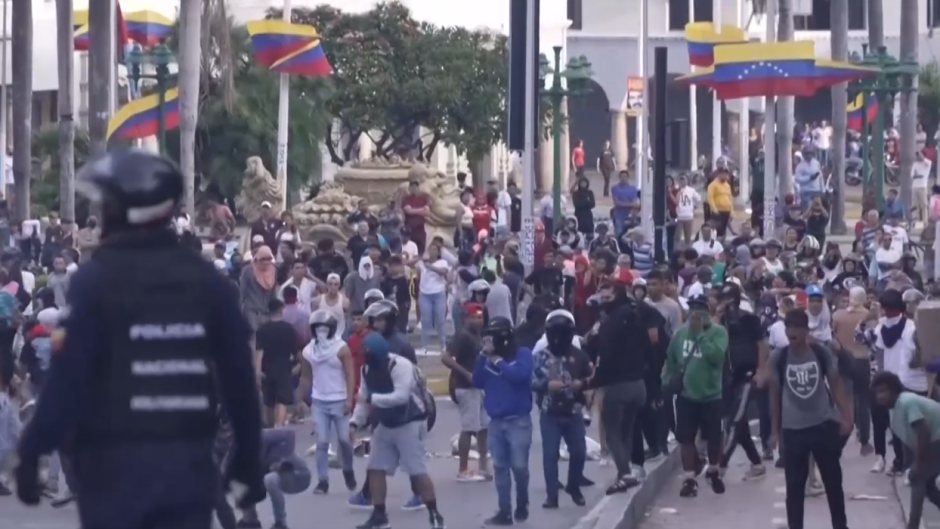Uncertainty in Venezuela as evangelicals join calls for democratic transparency
Protesters denounce “fraud” in the streets and the opposition candidate claims to have proof that he won the elections by a landslide. Maduro cuts relations with seven Latin American countries as he vows to “defeat the violent”.
30 JULY 2024 · 12:00 CET

In Venezuela, Nicolás Maduro has been declared again the winner of the presidential election, amid street protests and accusations of fraud by the opposition.
According to the country's authorities, the Chavista regime leader won the election with 51.2 per cent of the vote, compared to 44.2 per cent for the opposition candidate, Edmundo González, with a difference of half a million votes.
Thousands have taken to the streets demanding “freedom” and a transparent recount, chanting with pots and pans, and demolishing statues of the regime in some cities. Pre-election polls predicted a clear defeat for the president.
Economic crisis, refugees, and a one-man regime
Venezuela is experiencing a deep economic crisis that has caused high levels of poverty in many families. There are also shortages of medicines and critical needs in other public services.
According to the United Nations refugee agency, some 8 million have left the country in recent years.
Police have responded to the protests with tear gas and arrests, while Maduro said he knows "how to defeat the violent". Several people are reported dead in the clashes.
Confieso que jamás imaginé que esto podía llegar a suceder en Venezuela: la gente derrumbando estatuas de Chávez.
Un tipo que llegó a ser endiosado, venerado y llorado a mares en el momento de su muerte... hoy es destruido y rechazado por los sectores más populares. Adiós al… pic.twitter.com/1aOhsKw4zz— Andreina Flores (@andreina) July 30, 2024
Emigrants in the rest of the world have joined the protests on social media and in demonstrations abroad, demanding an end to what they see as a communist dictatorship. Nicolás Maduro has led the country since 2013, taking over from Hugo Chávez, who presided over the country for 14 years.
There have also been public prayer meetings, both in Venezuela and in foreign capitals.
International demands for democratic transparency
Opposition leader María Corina Machado claimed to have proof that her political movement had won with more than 70% of the vote and explained that her team was working on a website to publish detailed official results by regions.
The UN and the Carter Center, the only two entities that received permission to observe the elections, have called for the publication of all polling station results, which is “fundamental”, they said, to ensure that the outcome is transparent. UN Secretary-General António Guterres called for “full transparency”.
Dozens of countries have also demanded that Venezuela show evidence of the victory of Maduro’s Socialist Party.
Among the Latin American countries that have not recognised the results are Argentina, Chile, Uruguay, Costa Rica, Peru, Panama and the Dominican Republic. The Venezuelan president has responded by expelling their diplomatic staff and accusing their governments of behaving like “fascists” in the service of the United States.
Christians and Maduro
In a country with a high percentage of Christians, Nicolás Maduro assured during the election night celebration that “the people of Venezuela are a Christian people. We are the people of Christ”. He added: “I want to thank all the Christian people for their prayers, for their blessings, for their love”.
The president has made efforts in several public events in the last political term to display the alleged support of evangelical pastors for his leadership.
Christian leaders who have expressed opposition to the regime have been punished.
Entities such as the Evangelical Council of Venezuela have called for “no politicisation of faith”. Other pastors in the country and in exile have on many occasions denounced the government's attempt to use like-minded church leaders to strengthen the regime, with economic aid through projects such as ‘Social Church’ and ‘My well-equipped church’.
Most evangelicals who have left Venezuela in recent years for countries such as Colombia, Spain, Brazil or the US, say they pray for the fall of the regime. Many expressed this desire after the last presidential elections, in 2019, which also triggered protests.
One more year
Learn all about our #OneMoreYearEF campaign here (English).
Published in: Evangelical Focus - world - Uncertainty in Venezuela as evangelicals join calls for democratic transparency
